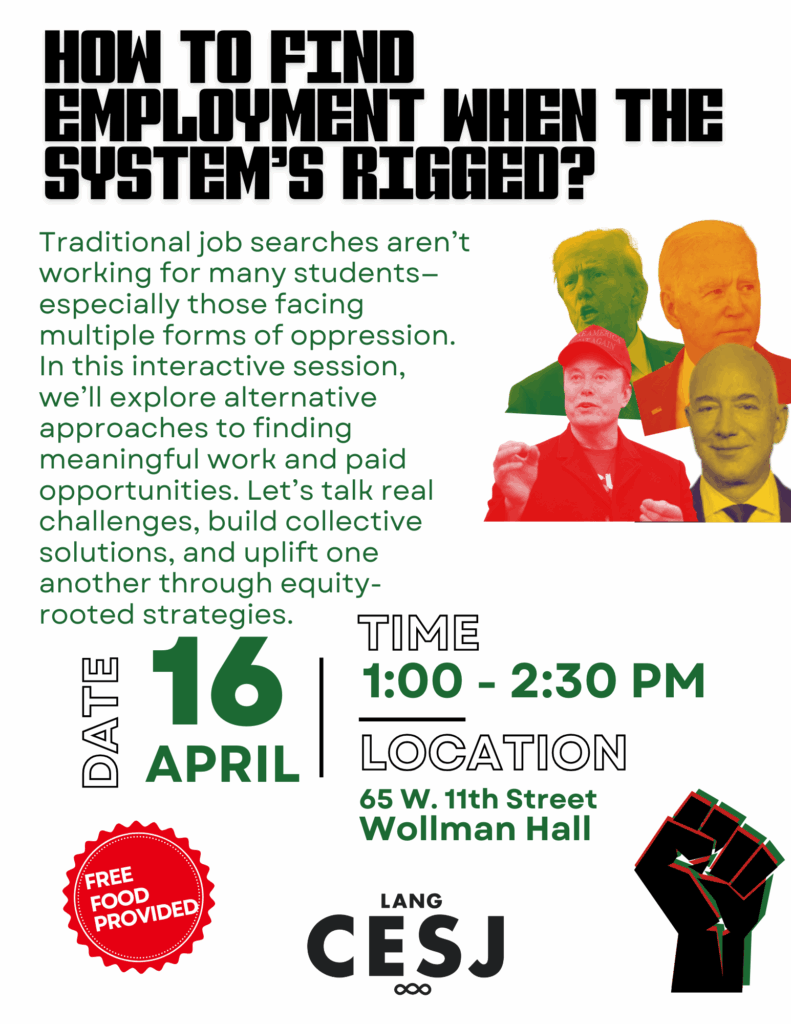Graduating college often marks the celebration of a major accomplishment — students walk away with more than just a diploma; they carry proof of their will and dedication to their education and career. But for many graduates, the excitement quickly fades as the looming job search becomes a frustrating reality. In today’s increasingly selective and competitive job market, the journey to job security post-graduation has become an uphill battle.
On April 16, Eugene Lang’s Office of Civic Engagement and Social Justice (CESJ) hosted an event titled How to Find Employment When the System’s Rigged? Held in Wollman Hall at 65 West 11th St., the event featured two speakers from the Office of Equity and Belonging who offered advice on how to navigate a job market that many feel is unjust and exclusionary.
The interactive event provided a space for conversation, vulnerability, and mutual support. Students shared their confusion about basic professional expectations, like writing cover letters and crafting resumes, with many admitting to feeling lost. Student attendees expressed feeling overwhelmed and unprepared, not only struggling to find full-time positions but also dealing with the emotional toll of unanswered applications and unclear paths forward. The frustration in the room was palpable.

Given the event’s title, inequality in the job market was a topic of discussion. While occupational discrimination has been illegal for decades — thanks to Title VI of the Civil Rights Act of 1964 and Title IX of the Education Amendments of 1972 which prohibit employment discrimination on the basis of sex, gender, or race — disparities still persist in 2025.
According to Payscale’s Gender Pay Gap Report, “In 2025, the uncontrolled gender pay gap is $0.83, meaning that women collectively earn 17 percent less than men.” The report also noted, “Even if the controlled gender pay gap disappears — meaning women and men with the same job title and qualifications are paid equally — an uncontrolled gap would still demonstrate that women are valued less by society for their work.” With President Trump’s cut to Diversity, Equality, and Inclusion (DEI) programs, employees and job hunters alike face the risks of an increasingly exclusive workforce.
Discrimination isn’t the only thing rigging the system — automation and recession fears are also altering the job market. With job applications increasingly screened by AI, applicants often don’t even have the chance to show their face or tell their story in an interview. Recession paranoia is being fueled by spiking unemployment rates. According to the U.S. Bureau of Labor Statistics, a principal data tracking agency, “In February 2025, the number of unemployed for five weeks or less was 2.3 million … [accounting] for 30.0 percent or more of the total unemployed since December 2021.”
Amid this bleak outlook, the event provided some hope for attendees through strategy, community, and conversation.
Anthony Wilder, the director of CESJ, shared how the idea for the event emerged during a faculty meeting. He noted how the faculty found that students were “feeling discouraged and feeling like they are the problem but not recognizing that the system’s actually the bigger problem than themselves,” he said.
“We really wanted to normalize [that] this was an experience that you’re not the only one experiencing, and then [help] them to navigate and be creative about how to look for jobs in this market that’s not kind to us,” Wilder said.
Wilder also emphasized the power of networking through existing resources. “We want folks to realize who’s in your network, who are the people you can reach out to and connect with.” Wilder continued, “If this person was of interest, what’s the harm in finding them on LinkedIn and sending them a quick message saying, ‘hey, you spoke about this in our class … This connects and aligns to this work I want to do. Can we chat?’”
At the event, students were encouraged to embrace their individuality and “special sauce” — a concept brought forward by Associate Director of CESJ Aysa Gray and defined as the quality setting one apart from others. Gray encouraged finding the job that best suits your personal skills and showcasing them confidently, but it takes persistence, strategy, and sometimes a community to help find it.
For support, undergraduate and graduate students have resources available, like the University Learning Center, which offers assistance with cover letters, resumes, interview prep, and more. Networking remains a powerful tool. Whether through online platforms like Handshake or LinkedIn, connecting with professionals can open doors.
“Sometimes those small connections can lead to opportunities … So, just [be] open and just taking the time to connect,” Wilder said. “Finding a full-time job is a full-time job.”







Leave a Reply